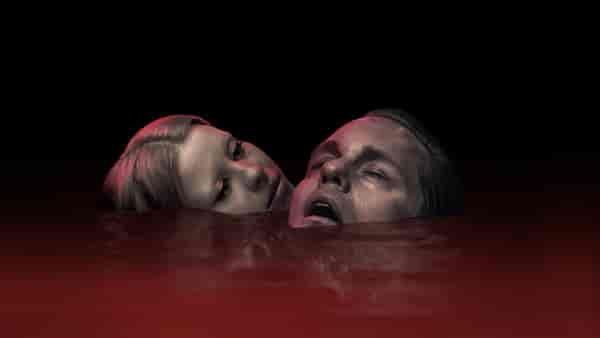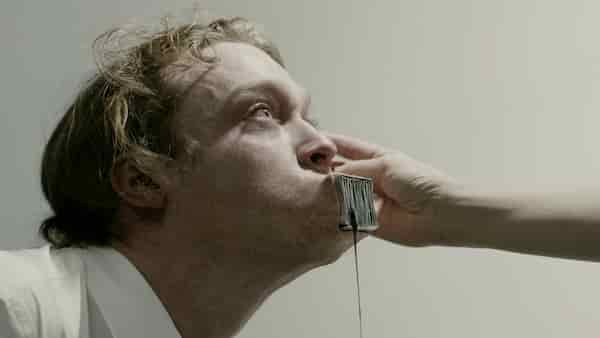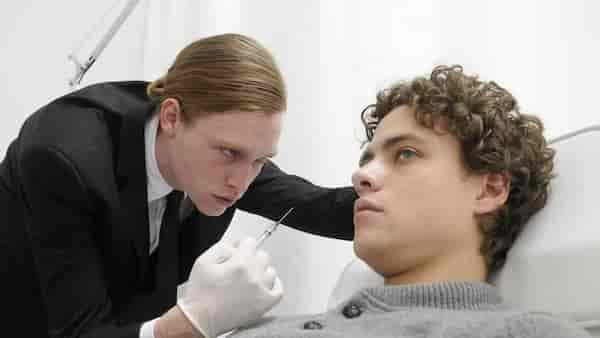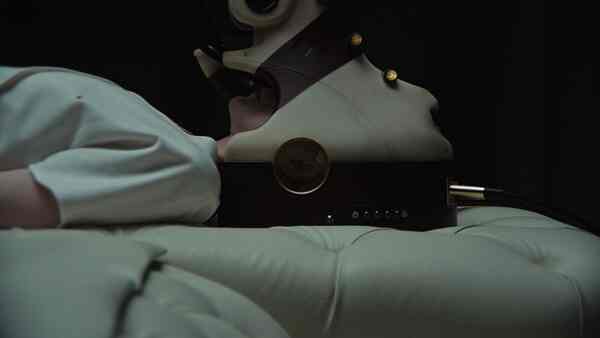Newsletter: Brandon Cronenberg Wants To Take Us All To Hell
The dystopian visions of Brandon Cronenberg are fuelled by the fears of what technology can make us capable of, and mapped to the iconography of body horror, writes Prahlad Srihari.

Last Updated: 03.21 PM, Sep 06, 2023
This column was originally published as part of our newsletter The Daily Show on September 6, 2023. Subscribe here. (We're awesome about not spamming your inbox!)
***
RABID fans of a near-future pay to be infected with the illnesses of their beloved celebrities, taking hero-worship to the extreme of hero-communion. Assassins of an alternate reality hack into the minds of patsies to carry out corporate-sanctioned murders with complete impunity. Wealthy tourists visiting a fictional Eastern European country can live out their most terrifying GTA fantasies — thanks to a law which allows their clones to answer for their crimes. The dystopian visions of Brandon Cronenberg are fuelled by the fears of what technology can make us capable of.
Needles puncturing the skin and scalp. Open sores oozing festering pus. Faces torn off like Halloween masks. Skulls crushed liked egg shells. Torsos gored to the guts. Blood-smeared breasts suckled by a man reborn in corruption. The contours of Cronenberg’s dystopias are mapped closely onto the iconography of body horror. As the name suggests, the human body becomes the centrepiece of horrors, the locus of all anxieties. Above all, it represents a blank canvas for Cronenberg to vivisect the often-violent interface between humans and technology.

By biological design, the fleshy vessels we inhabit do not allow us to see ourselves in frame. Not without a mirror at least. There is thus an inherent sense of otherness felt by a mind embodied. The graphic transfiguration of our bodies — via horrors inflicted upon them — spurs the mind into a deeper self-consciousness. On the flip side, perverting the integrity of the body can fracture one’s sense of self. The physical projection of the resulting internal unrest is epitomised in Cronenberg’s second feature Possessor, where the assassin Tasya Vos (Andrea Riseborough) assumes control of other people’s bodies on her murderous assignments. The duality of liberation and confinement on inhabiting a body not one’s own sits at the heart of the corporeal invasion.
It goes without saying the name Cronenberg is synonymous with body horror. In today’s parlance, the 43-year-old Canadian filmmaker is what you might call a nepo baby. But without doubt a legitimately gifted one. The younger Cronenberg occupies a cardinal place in today’s body horror firmament as his father David did from the '70s to '90s. With sister Caitlin soon set to make her own feature debut about a euthanasia programme gone horribly wrong, one can imagine family get-togethers turning into genre filmmaking workshops.

“Like Father, like Son” and headlines of the like emerged soon after Cronenberg Jr’s first feature debuted at Cannes 2012. In the media-saturated landscape of Antiviral, companies capitalise on the fans’ desire to feel close to their favourite A-lister, enough to literally want to consume them. As if being bombarded with TV commercials and billboards all day weren’t enough, the cult of celebrity reaches such a fever pitch that delis sell steaks grown from the cells of the rich and famous. “Celebrities are not people, they’re group hallucinations,” says the founder of Lucas Clinic, which caters to the needs of those who wish to be infected with whatever illness ails the stars.
Syd (Caleb Landry Jones), one of the lab technicians at the company, has turned himself into a human incubator. On the side, he has been selling pirated viruses at the black market. But the injection of a mysterious but deadly new pathogen sets the course for an unsettling albeit muddled conspiracy thriller. Cronenberg Jr splices the symptoms — the paranoia, the fever, the hallucinations — into the film’s very form. The air of escalating anxiety is perfumed with sanitised images hiding the rot underneath, like the thin layer of moisturised skin that hides the gory entrails within our bodies. The antiseptic world with its anonymous white labs and its single-minded celeb worshippers reinforces the feeling of a future lacking in warmth and humanity.

Anonymity is the greatest weapon for an assassin. The alternate 21st century of Possessor is home to a shadowy corporation whose agents transport their consciousness into people close to their targets. Once the target has been eliminated, the hosts are coerced into eliminating themselves, while the assassins return to their own bodies. This ensures the assignments are completed incognito and there is no trace left behind. For Riseborough’s Tasya, the next target is the wealthy CEO John Parse (Sean Bean). The host? Colin Tate (Christopher Abbott), fiancé to John’s daughter Ava (Tuppence Middleton). But borrowing the skin of this passive, benumbed and emasculated man proves more difficult than she imagines. Colin surprisingly rebels against the invading consciousness and channels Tasya’s violent impulses to express desires that have been repressed for too long. All the bodysnatching has detached Tasya from others, especially creating an emotional distance between her and her family. With a fragile connection to her husband and child as tether, she starts to lose her footing inside Colin’s body.
The violence of losing autonomy and two minds battling for control over one body is abstracted with faces stretching, melting and reassembling in images awash in red and yellow flares. One scene finds Colin, inhabited by Tasya, having sex with Ava, which then bleeds into Tasya seeing herself in her own skin with Colin’s erect penis — an embodiment of a mind and body jostling for control. Tasya taking possession of people’s bodies but being haunted by the ghosts in the machine can be read as a metaphor for acting — a profession which calls into question where one identity begins and the other ends.

Insofar as slick surfaces with rotten cores and bodies being misappropriated are concerned, Infinity Pool makes for an unhinged third feature worthy of the Cronenberg name. James (Alexander Skarsgård) and his wife Em (Cleopatra Coleman) arrive at a holiday resort in the fictional country of Li Tolqa, the kind of place white novelists with money go to overcome their creative block and couples with money go to save their marriages. With his first book poorly reviewed and barely read, James finds a rush of inspiration in the form of Gabi (Mia Goth), who evidently loves the book enough to jerk him off behind a tree. Real trouble begins when a drunk James kills a local in a hit-and-run. The accident lands him in prison where he is given a choice: face the death penalty at the hands of the victim’s son or pay your way out of it by letting a clone die in your place. No prizes for guessing which option he chooses. Liberated from the bounds of justice, James and his fellow wealthy tourists get a kick out of how far they can sink into depravity, enough for it to become a kink. Infinity Pool is like The White Lotus drenched in blood, piss and acid: an eat-the-rich satire with serrated teeth.

That Cronenberg Jr’s next project is a miniseries adaptation of JG Ballard’s novel Super-Cannes — about the corporate elite whose bestial drives demand prompt fulfilment — should come as no surprise. In Ballard’s dystopias, humans often become obliging participants in their own dehumanisation when faced with the disintegration of their world. In fleshing out his dystopias, Cronenberg takes a leaf out of Ballard’s books. One of which — Crash — was made into a chilling film by dad David. Its world premiere shook up Cannes in 1996 and its subsequent release prompted a moral panic.
In light of the interplay between body and mind and the overlap of violence and sexuality, it may be impossible not to see the younger Cronenberg’s work through the lens of the elder Cronenberg’s. Certainly, there is some thematic kinship. Possessor shares mutated DNA with eXistenZ (human minds warped by technological advancements) and Dead Ringers (two minds operating as a single closed system). Antiviral diagnoses a culture infested by media worship, not unlike Videodrome and Crash, even if nowhere close to as incisively. On harvesting the pathogens of superstar Hannah Geist (Sarah Gadon), the excited Syd remarks how she is so beyond perfection it gives him the “shivers.” An eager reading may consider it a winking nod to the 1975 body horror feature of the same name by dad David.

Nonetheless, to view Brandon’s work as a metastatic outgrowth of dad David’s is to do a great disservice to a burgeoning auteur. Interviews reveal a man doubly anxious to distance himself from the nominal association (“I’m making movies that are interesting to me and honest to my own creative impulses.”) If his father keeps a restrained distance from his subject so as to make the discomfort feel oppressive, Brandon likes to get up close and personal with humanity’s vices and worst instincts intact. Antiviral, Possessor and Infinity Pool all lay bare a fascination with blood and bodily fluids matched only by a fancy for intoxicating camerawork and hyper-stylised imagery. With each gonzo mindfuck, the son seems to be filming his way out of his father's shadow and building his own horror legacy. A film about the loss of identity, like Possessor, thus takes on a personal dimension: as a filmmaker eager to claim his otherness, assert his own voice, and urge audiences to accept him on his own terms.

 Premium
Premium